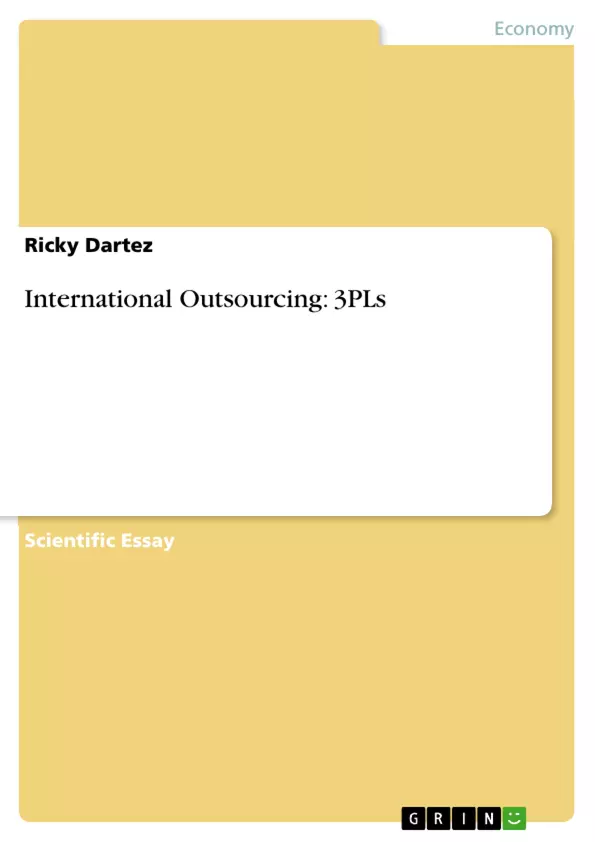Increased globalization has led to the increased importance of Supply Chain
Management for most businesses involved both domestically and internationally.
Globalization has led to record levels of competition from competitors both domestically and
internationally. The underlying factors involved in competitive pressure due to globalization
are not only the trends of reducing the costs of procurement and decreasing the risks related
to purchasing activities, but also the need to develop competitive edge through core
competencies which allow businesses to differentiate themselves from competitors and stand
out in the market by offering not only a productivity advantage, leading to lower prices, but
also a value advantage which differentiates its products from its competitors’ products
(Sovereign, 2008). Within a domestic market, productivity advantage has been a linchpin of a
company’s overall competitive advantage, enabling them to offer lower prices on the end
product. However, the global market is more complex—often requiring a significant level of
cultural intelligence and a vast knowledge of varying regulations and social issues prevalent
within a company’s target market. Companies often find that the level of attention, expertise
and resources required for developing the relationships required to effectively manage
logistical complexities involved in a multi-national supply chain to be prohibitive to the
development of the very same core competencies required to maintain their productive
advantages, and experience significant difficulty balancing the two aspects of international
logistics management within their supply chains. Many have found the balancing act easier to
accomplish through the outsourcing of logistical functions to third-party logistics providers
(3PLs). [...]
Inhaltsverzeichnis (Table of Contents)
- International Outsourcing: 3PLs
- The True Value of 3PLs
- Facilitation of Strategic Relationships through Enhanced Capabilities
- The Importance of Collaboration
Zielsetzung und Themenschwerpunkte (Objectives and Key Themes)
This research paper explores the increasing significance of third-party logistics providers (3PLs) within international supply chains. The paper examines the value proposition of 3PLs in contrast to traditional freight forwarders, highlighting their ability to foster strategic alliances and provide customized value-added services. Additionally, the paper explores the impact of collaboration and the use of information technology in strengthening these relationships within the global supply chain.
- The growing importance of 3PLs in international logistics.
- The strategic value of 3PLs compared to freight forwarders.
- The role of value-added services and industry-specific expertise in differentiating 3PLs.
- The impact of collaboration and information technology on supply chain efficiency.
- The evolution of 3PL relationships from transactional to strategic partnerships.
Zusammenfassung der Kapitel (Chapter Summaries)
The paper begins by defining international logistics and highlighting the challenges companies face in managing complex global supply chains. The author then discusses the benefits of outsourcing logistics functions to 3PLs, emphasizing their role in developing core competencies and facilitating relationships within international markets. The paper further examines the value proposition of 3PLs compared to traditional freight forwarders, emphasizing their ability to build strategic alliances and provide customized value-added services. The importance of collaboration and the use of information technology in enhancing supply chain efficiency are explored, demonstrating how 3PLs leverage technology to improve operations and facilitate communication within the global supply chain.
Schlüsselwörter (Keywords)
International Outsourcing, 3PLs, Supply Chain Management, Globalization, Strategic Partnerships, Value-Added Services, Information Technology, Collaboration, Global Supply Chains, Freight Forwarders, Logistics.
Frequently Asked Questions
What is a 3PL in international logistics?
A 3PL (Third-Party Logistics provider) is a company that manages outsourced logistical functions for businesses, such as transportation, warehousing, and distribution.
How do 3PLs differ from traditional freight forwarders?
3PLs often provide more customized, value-added services and seek to build strategic alliances rather than just handling simple transactional shipping tasks.
Why has globalization increased the importance of 3PLs?
Global markets are complex, requiring expertise in regulations and cultural intelligence. 3PLs allow companies to focus on their core competencies by handling these logistical complexities.
What is meant by "value advantage" in supply chain management?
Value advantage differentiates a product from its competitors not just through price, but through superior service and efficient delivery managed by logistics partners.
What role does information technology play in 3PL relationships?
IT is used to enhance collaboration, improve operational efficiency, and facilitate real-time communication across the global supply chain.
- Citation du texte
- Ricky Dartez (Auteur), 2012, International Outsourcing: 3PLs, Munich, GRIN Verlag, https://www.grin.com/document/210225



